Real Latest 70-689 Exam Questions Updated By Official Microsoft Exam Center! Braindump2go Offers 70-689 Dumps sample questions for free download now! You also can visit our website, download our premium Microsoft 70-689 Exam Real Answers, 100% Exam Pass Guaranteed!
Vendor: Microsoft
Exam Code: 70-689
Exam Name: Microsoft Upgrading Your Skills to MCSA Windows 8.1
QUESTION 191
You administer a company network that includes computers that run Windows 8 Enterprise in an Active Directory domain.
The company has purchased a subscription to Windows Intune.
Corporate security policy requires that computers in the accounting department have file and program activity logged.
A user in the accounting department uses a computer that is managed by Windows Intune.
You need to ensure that file and program activity is always monitored on this computer.
What should you do?
A. Create a new Windows Firewall Setting policy in the Windows Intune Admin Console.
B. In the Windows Intune Admin Console, create a new Windows Intune Agent Settings policy
that uses the recommended settings.
C. Create a new Windows Intune Mobile Security policy in the Windows Intune Admin Console.
D. Create and deploy a custom policy in the Windows Intune Center Settings template.
Answer: B
Explanation:
Configure Your Windows Intune Environment
Reference:
http://technet.microsoft.com/en-us/library/hh441722.aspx
To set up the default Windows Intune Policies:
1. Open the Windows Intune administrator console.
2. In the workspace shortcuts pane, click the Policyicon.
3. Under Tasks, click Add Policy.
4. In the Create a New Policy dialog box, the following policy templates are displayed in the list of templates in the left pane:
– Mobile Device Security Policy
– Windows Firewall Settings
– Windows Intune Agent Settings
– Windows Intune Center Settings
QUESTION 192
Drag and Drop Questions
You use a desktop computer and a laptop, both of which run Windows 8.
You use a Microsoft account to log on to the desktop computer and a local user account to log on to the laptop.
The desktop computer is joined to the HomeGroup and the laptop is a member of a workgroup. When you access a frequently visited website from your laptop, Internet Explorer saves your password.
When you visit the website from your desktop computer, you are prompted to enter your password.
You need to sync your saved password from your laptop to your desktop computer.
Which three actions should you perform on the laptop in sequence? (To answer, move the appropriate actions from the list of actions to the answer area and arrange them in the correct order.)

Answer:

Explanation:
– Microsoft has integrated its cloud computing features into much of Windows 8.
The focal point of that integration is the soon to be re-branded Windows Live service–use a Windows Live account as your login, and you can synchronize much of the information associated with your account to all your Windows devices through the cloud.
Or at least, that’s the goal.
– Setting up for synchronization starts when you configure your user account.
At installation, Windows 8 prompts you for a Windows Live account.
You can create a new Live account or use an existing one for your user credentials, or choose to bypass this and set up a local-only user account–but you won’t be able to leverage the synchronization features if you do.
You can also opt out later and switch to a local-only account through Windows 8’s settings menu. When you set up your user account–either at install time or from the PC settings menu afterward– you’ll be prompted to either use an existing Live account email address or enter a new one
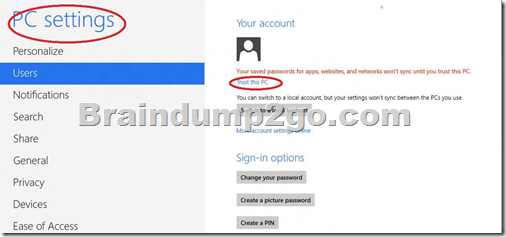
QUESTION 193
Drag and Drop Questions
You support computers that run Windows 8 Pro.
Your company recently purchased 200 new desktop computers.
Company policy requires that the desktop computers include a recovery partition.
The partition must contain a bootable image that includes support for incoming Remote Desktop connections.
You need to configure the desktop computers to comply with company policy.
Which four actions should you perform in sequence? (To answer, move the appropriate actions from the list of actions to the answer area and arrange them in the correct order.)
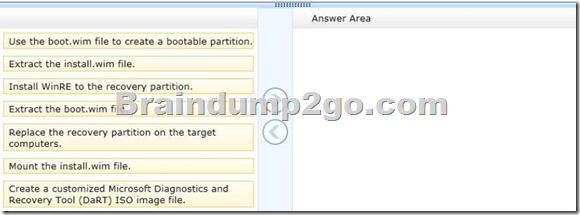
Answer:
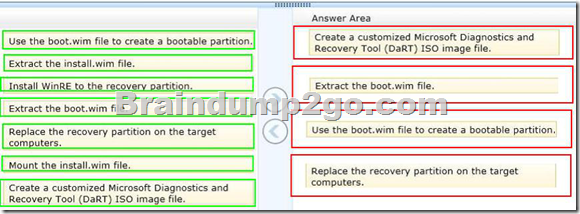
Explanation:
After you have finished running the Microsoft Diagnostics and Recovery Toolset (DaRT) 8.0 Recovery Image wizard and created the recovery image, you can extract the boot.wim file from the ISO image file and deploy it as a recovery partition in a Windows 8 image.
A partition is recommended, because any corruption issues that prevent the Windows operating system from starting would also prevent the recovery image from starting.
Reference: How to Deploy the DaRT Recovery Image as Part of a Recovery Partition
QUESTION 194
You have computers that run Windows 8 Enterprise.
Microsoft BitLocker Administration and Monitoring (MBAM) is deployed on your network on a server named MBAM1.
Company policy requires that within 2 hours of being started, computers that have the MBAM client installed prompt users to enable BitLocker.
You need to make changes to the Configure MBAM Services Group Policy settings.
Which two actions should you perform? (Each correct answer presents part of the solution. Choose two.)
A. Set MBAM Recovery and Hardware service endpoint to MBAM1.
B. Set Enter status reporting frequency (in minutes) to 120.
C. Set MBAM Status reporting endpoint to MBAM1.
D. Set Select Bitlocker Recovery Information to store to Recovery password and key package.
E. Set Select Bitlocker Recovery Information to store to Recovery password only.
F. Set Enter client checking status frequency (in minutes) to 120.
Answer: AD
Explanation:
Client Checking Status Frequency is already set to 90 minutes per default, so there is no need to change it. When you create new MBAM policy, the most important settings would be “MBAM Recovery and Hardware service endpoint” and “Select Bitlocker Recovery Information to store”. Therefore answers A & D seem to be the only logical choice.
http://technet.microsoft.com/en-us/library/dn186167.aspx
http://social.technet.microsoft.com/Forums/windows/en-US/4189921b-d6bf-4d45-ba90-ca313864a9f1/mbam-group-policy-questions?forum=w7itprosecurity
QUESTION 195
You administer computers that run Windows 8 Enterprise in an Active Directory domain.
Your company has purchased a subscription to Windows Intune.
Users access a Microsoft Exchange environment by using the Mail tile.
The Microsoft Exchange environment is connected to Windows Intune.
Company security policy defines the minimum length of passwords and required encryption settings.
You need to create a Windows Intune policy that meets the security policy requirements.
What should you do?
A. Create a new Windows Intune Center Settings policy.
B. Create a new Windows Intune Agent Settings policy.
C. Create a new Windows Intune Mobile Security policy.
D. Create a new Windows Firewall Settings policy.
Answer: C
Explanation:
Configure Your Windows Intune Environment
Reference: http://technet.microsoft.com/en-us/library/hh441722.aspx
To set up the default Windows Intune Policies:
1. Open the Windows Intune administrator console.
2. In the workspace shortcuts pane, click the Policyicon.
3. Under Tasks, click Add Policy.
4. In the Create a New Policy dialog box, the following policy templates are displayed in the list of templates in the left pane:
– Mobile Device Security Policy
– Windows Firewall Settings
– Windows Intune Agent Settings
– Windows Intune Center Settings
QUESTION 196
You support computers that run Windows 8 Enterprise.
Your company has started testing Application Virtualization (App-V) applications on several laptops.
You discover that the App-V applications are available to users even when the laptops are offline. You need to ensure that the App-V applications are available to users only when they are connected to the company network.
What should you do?
A. Configure mandatory profiles for laptop users.
B. Reset the App-V client FileSystem cache.
C. Disable the Disconnected operation mode.
D. Change user permissions to the App-V applications.
Answer: C
QUESTION 197
At work, you use a desktop computer that runs Windows 8 Pro.
At home, you use a laptop that runs Windows 8.
You use the same Microsoft account to log on to both computers.
You want to use the same settings for both computers.
You need to ensure that all computer settings, including stored passwords, are synced between the computers.
What should you do?
A. Add both computers to the same Active Directory domain.
B. Use the same local accounts for both computers.
C. Install SkyDrive for Windows on both computers.
D. Designate both computers as trusted PCs.
Answer: D
QUESTION 198
Your company recently purchased 10 new desktop computers for a remote unconnected location. All of the desktop computers have the same hardware configuration.
You install Windows 8 Pro on a reference computer and install a custom driver to support the video adapter.
You want to create an image of the reference desktop that retains the custom driver in the image. You need to edit the unattended answer file.
Which setting in the unattended answer file should you edit?
A. Microsoft-Windows-PnPSysprep | PersistAllDeviceInstalls
B. Microsoft-Windows-PnPSysprep | DoNotCleanUpNonPresentDevices
C. Microsoft-Windows-PnpCustomizattonNonWinPE | DriverPaths
D. Microsoft-Windows-Shell-Setup | OEMInformation
Answer: A
Explanation:
The Microsoft-Windows-PnpSysprep component specifies whether all Plug and Play information persists during the generalize pass.
Typically, during the generalize pass, all device information is removed from thecomputer.
If the device information is removed during the generalize pass, the next time the computer runs Plug and Play, the devices will be re-initialized.
Typically, the next time the computer boots, the specialize pass runs, and Plug and Play runs.
PersistAllDeviceInstalls
Specifies whether all Plug and Play information persists during the generalize configuration pass.
http://technet.microsoft.com/en-us/library/cc766005(v=ws.10).aspx
QUESTION 199
Drag and Drop Questions
You administer 50 laptops that run Windows 7 Professional 32-bit.
You want to install Windows 8 Pro 64-bit on every laptop.
Users will keep their own laptops.
You need to ensure that user application settings, Windows settings, and user files are maintained after Windows 8 Pro is installed.
Which four actions should you perform in sequence? (To answer, move the appropriate actions from the list of actions to the answer area and arrange them in the correct order.)
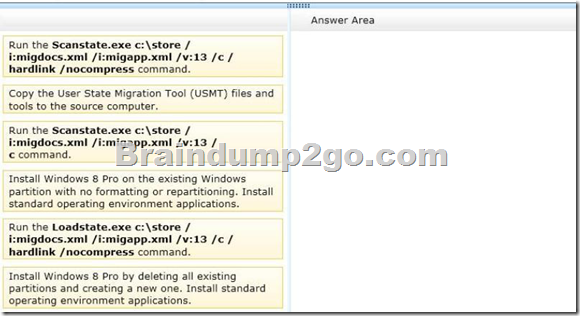
Answer:
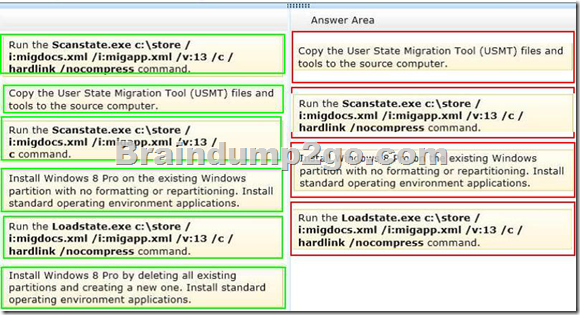
Explanation:
– You use the User State Migration Tool (USMT) 5.0 when hardware and/or operating system upgrades are planned for a large number of computers. USMT manages the migration of an end-user’s digital identity by capturing the user’s operating-system settings, application settings, and personal files from a source computer and reinstalling them on a destination computer after the upgrade has occurred.
One common scenario when only the operating system, and not the hardware, is being upgraded is referred to as PC refresh. A second common scenario is known as PC replacement, where one piece of hardware is being replaced, typically by newer hardware and a newer operating system.
– Scenario: PC-refresh using a hard-link migration store A company has just received funds to update the operating system on all of its computers to Windows 8. Each employee will keep the same computer, but the operating system on each computer will be updated. In this scenario, an administrator uses a hard-link migration store to save each user state to their respective computer.
The administrator runs the ScanState command-line tool on each computer, specifying the /hardlink /nocompress command-line options. ScanState saves the user state to a hard-link migration store on each computer, improving performance by minimizing network traffic as well as minimizing migration failures on computers with very limited space available on the hard drive.
On each computer, the administrator installs the company’s SOE which includes Windows 8 and other company applications.
The administrator runs the LoadState command-line tool on each computer. LoadState restores each user state back on each computer.
Reference: User State Migration Toolkit (USMT) Reference
QUESTION 200
You are a systems administrator for your company.
The company has employees who work remotely by using a virtual private network (VPN) connection from their computers, which run Windows 8 Pro.
These employees use an application to access the company intranet database servers.
The company recently decided to distribute the latest version of the application through using a public cloud. Some users report that every time they try to download the application by using Internet Explorer, they receive a warning message that indicates the application could harm their computer.
You need to recommend a solution that prevents this warning message from appearing, without compromising the security protection of the computers.
What should you do?
A. Publish the application through a public file transfer protocol (FTP) site.
B. Publish the application through an intranet web site.
C. Instruct employees to disable the SmartScreen Filter from within the Internet Explorer settings.
D. Publish the application to Windows Store.
Answer: B
Braindump2go Latest 70-689 Exam Dumps Released! 100% Real Questions – Dumps Qulification is the secret of Success! Prepare yourself to Face the 70-689 Exam with Real Exam Questions from Microsoft Official Exam Center, walk into the Testing Centre with confidence.

